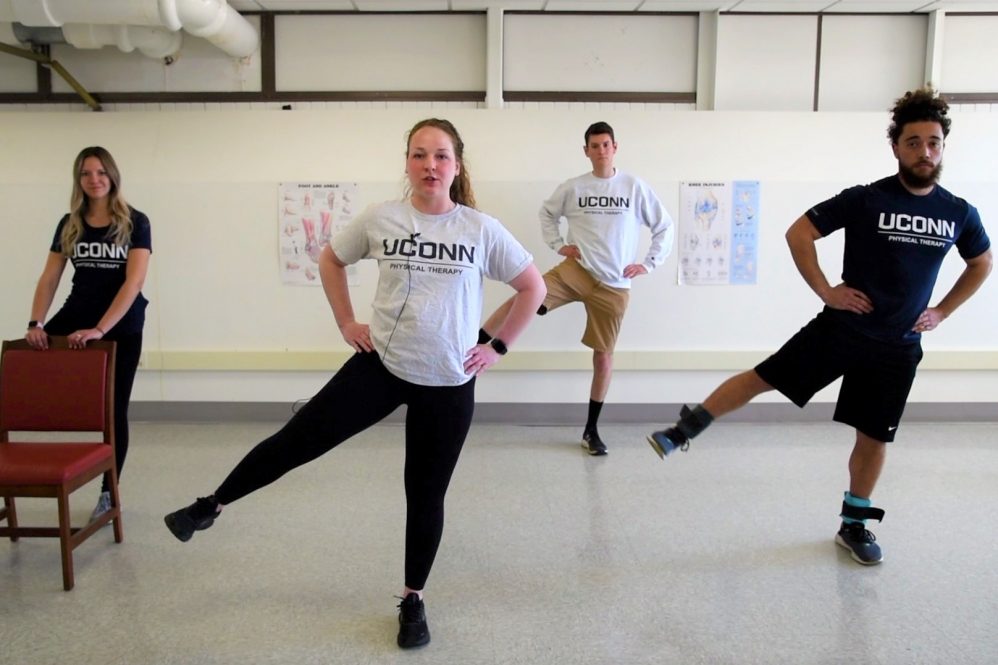The UConn C.A.R.E.S. Pro-Bono Clinic is located in Storrs as part of the College of Agriculture, Health and Natural Resources, but its impact on the community reaches far beyond the bounds of campus.
The mission of the C.A.R.E.S. Clinic is to provide physical therapy care for uninsured members of the community, or for those whose insurance does not cover the clinic’s services.
The student-run, faculty-guided clinic was officially started two years ago. Students in the Doctor of Physical Therapy Program work one-on-one with patients while receiving faculty mentorship.
“It’s a win-win situation for our students and for the patient,” Deborah Bubela, associate professor in residence, says. “It’s really about providing our students with the opportunity to learn from faculty how to work with a variety of patients.”
Students apply the wealth of knowledge they develop in the classroom to a real patient population. Students learn how to communicate with patients and gain first-hand experience with the kinds of challenges they will face as practitioners, including patients whose first language is not English or those who have limited access to in-person or virtual health services.
“Students start to understand the breadth of the challenges that they’ll face in their clinical experiences, and more importantly when they get out into clinical practice,” Craig Denegar, professor in the Department of Kinesiology, says. “That’s the best part of the pro-bono clinic – that learning experience that you just can’t reproduce without putting the student in front of a patient.”
In addition to the direct patient interaction, some students can take on a leadership role in the clinic’s organization and operations, thereby learning what it’s like to manage facilities of this kind.
One of the major emphases of the clinic is wellness services. Wellness services involve educating and guiding people to understand the importance of physical activity and develop a fitness program they can complete independently, including involvement in community activities like tai chi, yoga, or swimming classes.
While many health insurance plans cover physical therapy, many do not cover these wellness aspects. For people with chronic conditions like diabetes or neurological conditions, there is a great benefit from this kind of long-term health-management plan.
“One of the things we can do as a pro-bono clinic is fill that gap in for those non-covered services,” Denegar says.
One of the defining aspects of the clinic is its partnerships with community health centers such as First Choice Health Centers.
By working with communities beyond Storrs, the clinic is truly “wall-less,” as Denegar describes it.
“It’s the University really reaching out and being of service to the citizens of the state of Connecticut,” Denegar says.
Through this partnership, the clinic and First Choice are launching a Beat My BMI program, where students who work at the clinic created instructional videos to help people live healthier lifestyles. The program will also include monthly meetings where patients can ask questions and gain information.
First Choice is helping with outreach to eligible patients in their large network. The health centers are also translating the educational materials into Spanish.
Within weeks of the COVID-19 pandemic forcing the clinic to limit in-person visits, faculty and students adapted to provide telehealth services.
This allowed the clinic to continue to provide wellness and physical therapy services, accelerating their exploration of telehealth.
The clinic plans to continue to offer telehealth services in addition to in-person visits even after pandemic restrictions are lifted. The virtual platform may help meet the needs of individuals who lack transportation to the Storrs location.
“To offer that ability to have a telehealth session is really a great way to be able to deliver what we can,” Bubela says.
Telehealth care is fast becoming an expected skillset for students to gain during their educational training.
Bubela says as the clinic continues to expand its outreach, she would like more opportunities for wellness programming within UConn’s own community. As many people work at desks all day, there are plenty of opportunities to improve levels of physical activity and make workspaces more supportive of workers’ physical health, she says.
“What we are trying to do is provide a service to the community,” Bubela says. “It’s our attempt for UConn to give back to its community members and fill a gap that is present in the existing healthcare systems.”
Follow UConn CAHNR on social media



